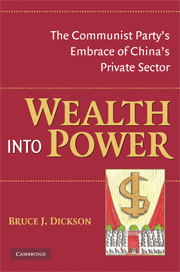Book contents
- Frontmatter
- Contents
- List of Tables and Figure
- Acknowledgments
- 1 Introduction
- 2 The Party's Promotion of the Private Sector
- 3 Co-opting the Capitalists
- 4 Bridges and Branches: The CCP's Institutional Links to the Private Sector
- 5 Views on the Economic, Political, and Social Environments
- 6 Private Entrepreneurs in Public Service: Participation in China's Formal Political Institutions
- 7 The Ripple Effects of Privatization: Corruption, Inequality, and Charity
- 8 Conclusion
- Appendix: Survey Design
- Bibliography
- Index
5 - Views on the Economic, Political, and Social Environments
Published online by Cambridge University Press: 05 September 2012
- Frontmatter
- Contents
- List of Tables and Figure
- Acknowledgments
- 1 Introduction
- 2 The Party's Promotion of the Private Sector
- 3 Co-opting the Capitalists
- 4 Bridges and Branches: The CCP's Institutional Links to the Private Sector
- 5 Views on the Economic, Political, and Social Environments
- 6 Private Entrepreneurs in Public Service: Participation in China's Formal Political Institutions
- 7 The Ripple Effects of Privatization: Corruption, Inequality, and Charity
- 8 Conclusion
- Appendix: Survey Design
- Bibliography
- Index
Summary
The emergence of a private sector in China has given rise to speculation that it will eventually lead to pressures for political change. Advocates of modernization theory see the social changes that accompany economic growth in China to be precursors of political change. The growing number of private entrepreneurs, the even larger middle class, and their greater integration into the political system give hope to some that their influence will ultimately push China in the direction of greater democracy. Expectations that China's private entrepreneurs will be agents of political change are based on two assumptions. First is that the Chinese Communist Party is a passive actor in this process. As previous chapters have emphasized, however, the CCP has actively promoted the expansion of the private sector, proactively recruited large numbers of entrepreneurs into the party (even though the majority of “red capitalists” were in the party before going into business), and strived with limited success to build corporatist-style institutional links and extend party organizations into private firms. The second assumption is that entrepreneurs hold policy preferences, values, and interests that are fundamentally different from those of incumbent officials in the party and government. In order to be agents of change, entrepreneurs would need to have both the motive and the opportunity to wield their influence in ways that will lead to change. Given the CCP's growing support for the private sector and the entrepreneurs' growing presence in the party, they clearly have the opportunity, but are their views on economic, political, and social matters so different from those of local officials that they will be motivated to change the system in which they have prospered?
- Type
- Chapter
- Information
- Wealth into PowerThe Communist Party's Embrace of China's Private Sector, pp. 136 - 166Publisher: Cambridge University PressPrint publication year: 2008



